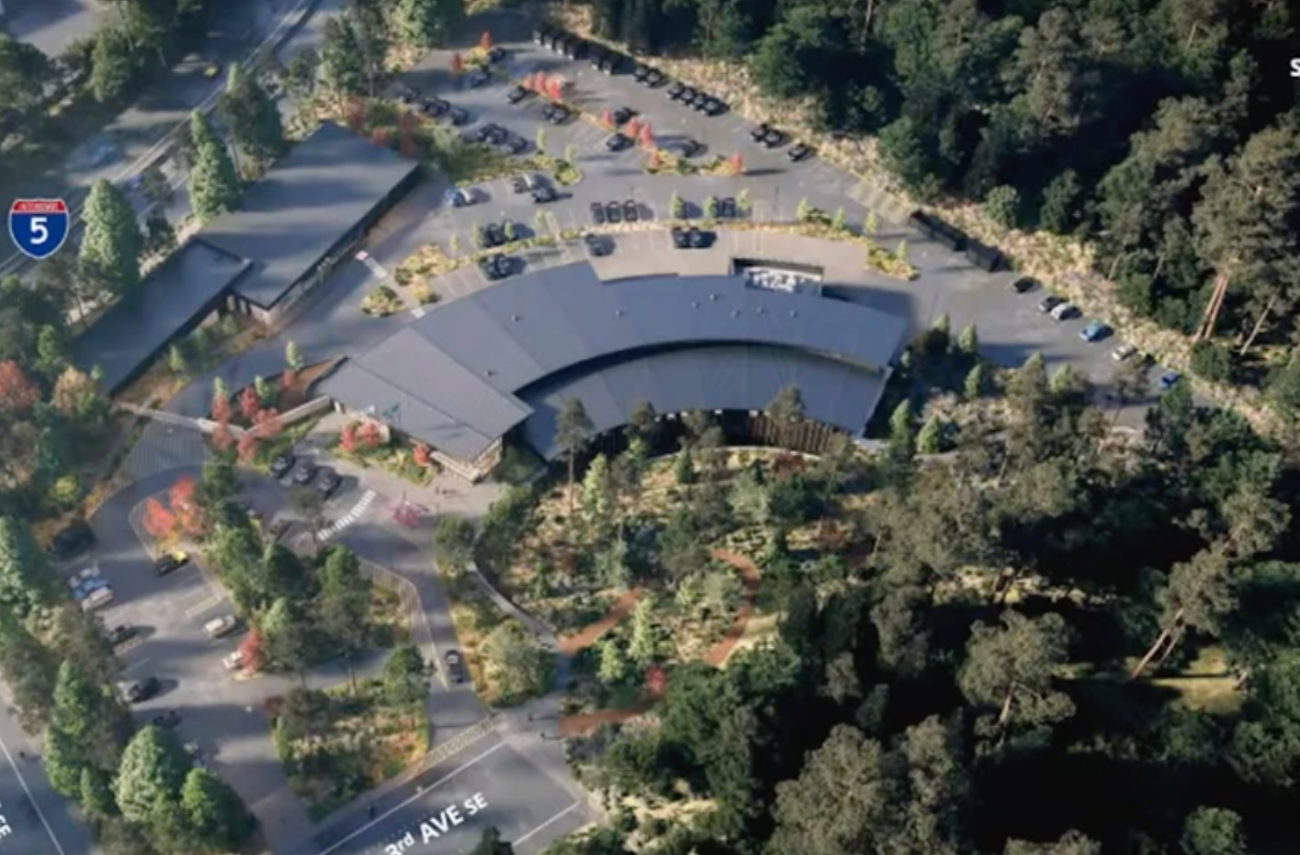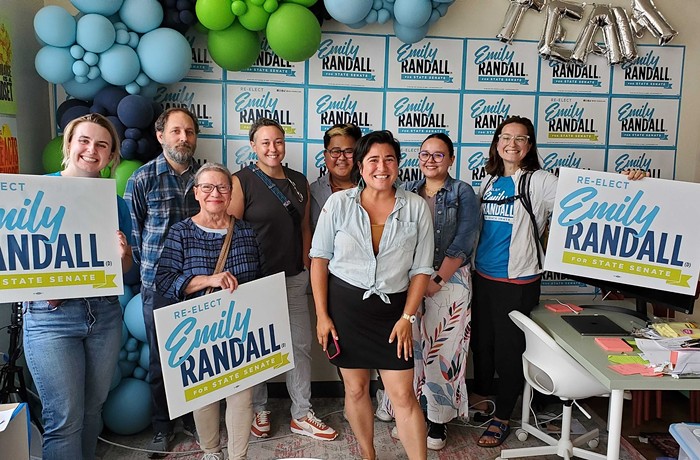As cops crack down on protesters across the country, concerns about militarized policing strategies continue to mount. The “Stop Cop City” movement, which grew from a three-year blockade of a massive police training facility near Atlanta, has emerged nationwide as one response to the issue. Signs of this movement’s spread can be seen via stickers embellishing Seattle stop signs and, more unusually, at recent protests in the small city of Lacey, WA, where the town recently broke ground on a new police station and regional training facility.
But is the facility in Lacey really a "cop city"? And for those opposed to expanding the police state, is it to stop it?
STOP COP CITY
On February 5, thirty protesters showed up at the groundbreaking ceremony for Lacey’s long-planned police station due to the casual addition of an entirely separate regional training facility building.
As city council members and police donned symbolic hard hats and shovels for a photo op, demonstrators shattered the staged scene with chants of, "No cops; no prisons! Total abolition!" Some wielded signs that read, “STOP COP CITY,” while other signs read, “Fund housing, not police,” indicating dissonance between the City’s priorities and the public’s.
Thurston County Sheriff Derek Sanders said that the protests were too little, too late. “It’s a little late once we start putting shovels in the ground,” he told KING 5 News.
Lacey’s new police station has been publicly discussed in city council meetings and in other forums since 2019. Citing Lacey’s growing population and limitations to the current police station building, the City says that it lacks the space to accommodate its predicted needs.
But the opportunity for Lacey to host a regional police hub first arose at a Thurston County Regional Coalition work session, said Lacey Mayor Andy Ryder. “I remember having a conversation at one of our work sessions over this, and I remember the chief bringing up the idea of having this training facility [in Lacey] and immediately my ears perked up,” he said.
In early 2022, the council approved a memorandum of understanding with St. Martin’s Abbey to allow the City to acquire 12 acres of forested property for the project. That agreement describes a police station, emergency management operations, and, finally, a police training center.
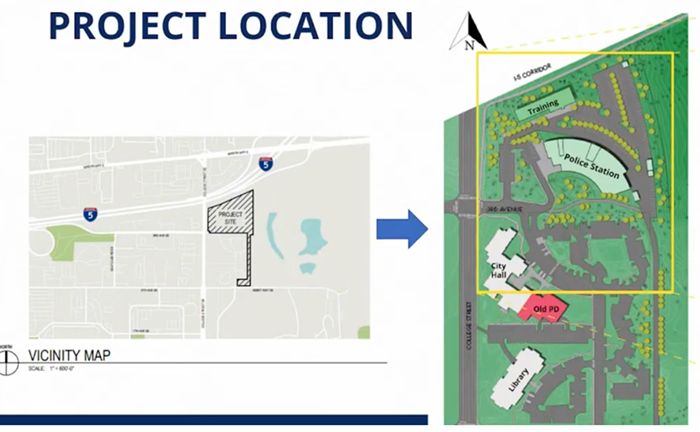
Final project specs show the police station nestled in the hillside of the property, rising two stories and spanning 48,600 square feet. The 15,000-square-foot training center will be standalone so that the station can accommodate more space for things like evidence storage and confidential interviews, in addition to offering a “more welcoming” lobby.
Inside, the training building will house an eight-lane firing range, an armory with gun-cleaning facilities, shell and site work training space, a digital training simulation room, defensive tactics training, and a large classroom for multipurpose use.
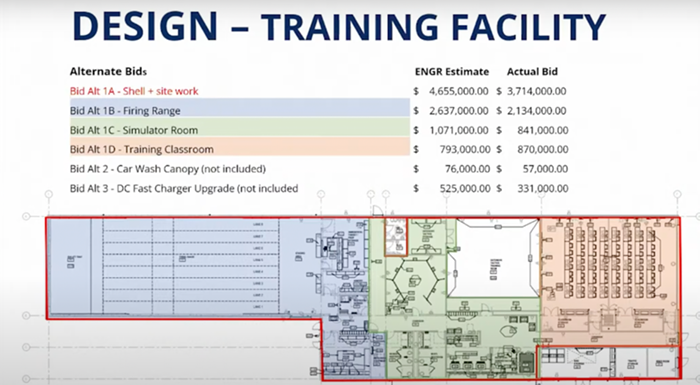
In recent meetings, local lawmakers say the training center would contribute to better training and collaboration between law enforcement in the region. They also think the development of both the new police station and the training facility will generate new jobs and help address western WA’s proported police shortage.
The "Cop City" Comparison
Including the $4 million land purchase, design, construction, and other costs, the City pegs the price tag for both facilities at $61.5 million. By comparison, the Atlanta Public Safety Training Center is shaping up to be much larger, spanning 85 acres in the middle of the Weelaunee Forest—the largest green space in the Atlanta area—and costing a whopping $109.65 million. That facility also includes “an explosives testing area, over twelve firing ranges, a Black Hawk helicopter landing pad, a training center to practice crowd control, a driving course for police to practice chases, and a 'mock village' with a hotel/nightclub and convenience store,” according to the Boston Review.
Lacey Council Member Lenny Greenstein said he hopes the City can offset some of the operations costs through partnerships with other agencies from across the region, including the Washington State Patrol, the Thurston County Sheriff's Office, and neighboring cities “who are clearly going to want to use this facility because there is nothing like it in the area.”
Public Concerns about Transparency and Priorities
The City plans to use a mix of bonds and general fund reserves to pay for the project, a funding strategy that, incidentally, allowed them to move forward without needing a public vote. Beyond city council meetings, the use of that strategy meant the training center’s funding approval process did not need to be communicated to the public, a fact that became a large point of contention for the community members who oppose the facility today.
Local grassroots organizer Greg Urquhart said he is one of many locals who believes the City’s funding strategy intentionally excluded public involvement to avoid “any potential speed bumps” on the path to construction.
“It looks like they passed this right before Christmas, when nobody was available to go to their city council meeting,” he said, referring to Lacey’s Dec 21, 2023 city council meeting. Only two city employees attended the meeting at the time of the approval.
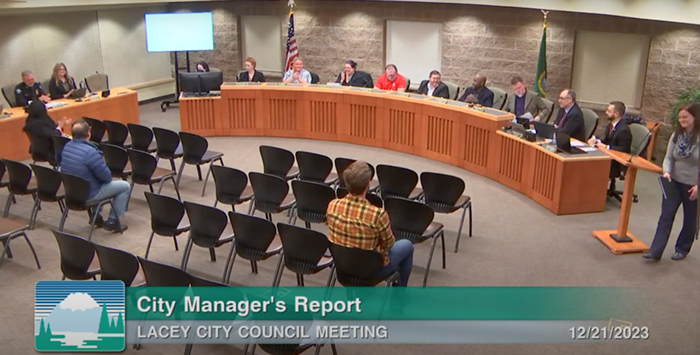
As evidenced by recordings throughout the process, Lacey City Council meetings have seen a sharp decrease in public participation overall throughout the pandemic. Pre-pandemic, when the public opposed something, they sat in the front row with large signs and returned repeatedly to speak on the matter. Throughout 2023, dust gathered on the public’s seats as city officials indulged in their dreams of making Lacey a hub for law enforcement from across the region.
Bunchy Carter, minister of defense for the Washington chapter of the Black Panther Party, said a lack of transparency has fueled public distrust.
“Being more transparent and forthcoming with information is a must, and they've done everything but that in this particular situation. I would hope that they understand that that's part of the reason why people feel the way they feel,” he said.
The Black Panther Party of Washington is only “peripherally involved” with the issue at this time as they await the full details about the training facility’s features, which continue to be sparsely communicated to the public.
“We already have a troubling trend of people who are having mental health crises, who are being killed by the police because the police aren't trained to deal with that,” he said. “Now they will have this facility to increase the degree of training that is being given, and I don't know that that's going to be training in de-escalation. I don't know if that's going to be training for dealing with mental health crises.”
When The Stranger spoke to Carter, the Lacey website had yet to add that the facility will also provide “spaces for mental health and homeless outreach professionals” and “training areas for continuing to enhance de-escalation techniques,” which it lists today.
Urquhart also brought into question the City’s use of $6.8 million in COVID relief funds that were previously set aside for permanent supportive housing. As an Indigenous activist and founder of two grassroots organizations, Red Road Rising and South Sound Street Medics, Urquhart has connections to Lacey’s most vulnerable populations, including unhoused people.
Somewhat ironically, in using those federal housing dollars to help fund the training facility, they contributed to displacement, Urquhart said. Carter affirmed this comment, saying that about 20 people living in the construction area, which is just off of I-5, to whom the Party was providing mutual aid can no longer be found.
Another large chunk of funding for the project comes from the City’s general fund reserves, specifically its arterial street fund reserves. Sounds like investments in roads and permanent supportive housing will have to take a backseat for now.
When asked for comment, the City of Lacey and the Lacey Police Department declined to speak about the training center at this time.
As for the claims that the facility is basically a "Cop City" for western WA, Urquhart and Carter see both similarities and differences when compared to the life-threatening situation in Atlanta.
For Carter, a second-generation Panther, the greatest concern is that the Lacey facility will give police a place to centralize scores of heavily armed officers to deploy in times of civil unrest, an evermore frequent sight in this present moment in history. “This is absolutely an opportunity to further militarize the police,” he said.
Urquhart, who is a military veteran, cautions that “a Cop City is not going to help us out in any way, shape or form. Increasing law enforcement just doesn’t work like that.”
